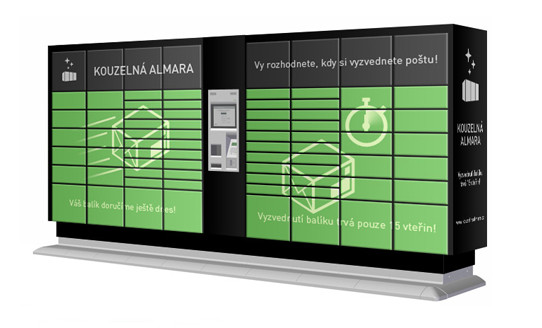The photo relates to a type of group buying Gruper.pl pioneered in Poland, offering daily deals on cars.
There are plenty of skeptics out there expecting Groupon industry to crash and burn. Yet in Eastern Europe industry executives are optimistic of what future holds for them, as I have learned during the Daily Deals Summit Europe.
Moderating a panel with Tom Cupr, founder and CEO of Slevomat Group, Tomasz Dalach, the co-founder and member of the board of Gruper.pl and Esra Sertoglu, the CEO of Grupanya required quite a bit preparation work. Here are findings that I would like to share.
In the East, as anywhere in Europe where over 1000 daily deals businesses battle for customers and merchants, the competitive pressure is strong, yet opportunities for growth are vast. According to Cupr of Slevomat Group, even if a company does not advertise, it will still grow as ecommerce market is expanding at 30 percent annually.
But before I continue talking about growth opportunities and industry challenges, let me name the main daily deals industry players in the region.
Slevomat Group, originating from Czech Repiblic holds leading market positions in Czech Republic, Slovakia, Hungary (via Bonus Brigad), Latvia, Lithuania and Estonia (via Cherry Media), and it is a strong player in Bulgaria. Cupr expects the turnover to exceed Euros 100 million this year.
Kolektiva, which was founded by Jeffrey Treichel, Dalibor Vukobrat and Martina Usmiani in Croatia, and funded by Rebate Networks (co-founded by Michael Brehm and Stefan Glänzer) is a leader in former Yugoslavian countries: Croatia, Serbia, Slovenia, Macedonia, as well as in Bulgaria and Albania. It is on the second place in Romania (Fun Deal), while its sister company mydeals.cz owned by Rebate Networks, has been recently acquiring other local players in Czech Republic and Slovakia.
Gruper.pl is the second largest daily deals company in Poland with 20 to 25 percent market share and Grupanya is slightly ahead of Groupon in Turkey.
These players are leaders in Eastern Europe, which consists of 20 countries and has 182 million inhabitants (or 255 if you add Turkey), about 50 percent of whom are Internet users, but not many shop online. Often signing up for a daily deal is the first ever online transaction for many first-time customers. So a two-for-one meal voucher often turns out to be a ticket to start buying online. Hence the “duty” of a daily deals site is to protect grow the trust to Internet commerce.
In the West deal fraud (or mis-selling) is one of the key industry challenges: in March this year GigaOM has reported Groupon UK having problems with regulators. In Eastern Europe it is hardly an issue, surprisingly.
First of all, daily deals businesses select their suppliers carefully, focusing on a long-term outlook and quality: this was essential to compete against Groupon and others. Secondly, there are financial mechanisms to keep merchants in check. In Turkey for example, Grupanya only pays the suppliers once they have delivered the service to the users as a way to control the quality, and prevent “take the money and run” situations.
The bigger pressure comes from the competition and the need to adjust the margins. Cupr, Dalach, Sertoglu and Childress all talked about the average level of commission between 25 and 30 percent, although in Bulgaria travel deals offer a half of that amount due to competitive pressure.
According Dalach of Gruper.pl, the need to compete with Groupon and Allegro in Poland requires offering better terms to the merchants, including upfront payments. This means turning a daily deals company into a receivables factoring business. But this may not necessarily be the future of the daily deals industry in Eastern Europe for the opportunities are wide open.
The most obvious path is to become online store or a travel agent, according to both Cupr of Slevomat and Childress of Kolektiva Bulgaria. After all, daily deals companies have a huge user base and brand awareness. Its merchants are still mainly services businesses, but no doubt, large in-house sales teams will be quick to bring new brick-and-mortar stores online (for example, Gruper employs 200 sales people).
Also Bulgarian classic ecommerce has not become mainstream yet, according to Childress. So going into this segment is a strategic initiative for Kolektiva. Bulgaria is also a popular travel destination in Eastern Europe, boasting both skiing and seaside resorts. So becoming a travel agent is another option for Bulgarian Kolektiva, aspecially since it can sell travel packages to the other CEE countries.
Turkey does not have a leading online store such as Amazon, so Grupanya may become a virtual mall selling third-party products (Grupanya is also one of the only two companies Intel Capital backed in Turkey). Even Groupon is experimenting with ecommerce, and whilst its inventories are depressing for now (at least in Germany), given its assets, the model has a bright future.
Dalach of Gruper.pl talked about being in essence an online media business and moving into the advertisement space. Whilst initially company worked mainly with SMEs, now it talks to the leading Polish banks and telcos, and may adopt fixed fee model in the future to cater to bigger brands.
Amongst other challenges of the industry is the need to educate merchants, majority of whom do not transact online (for example, in Turkey). Lack of adequate payment mechanisms may also be problematic. In Hungary and Bulgaria buying on impulse does not work as well because buyers have to pay via bank transfer which gives them time to think and reverse the decision, and they do not commit as much to promoting deals to their friends.
Mobile strategy in daily deals space also has payment issues. In as much as it is popular to talk about mobile coupons, the payment mechanisms are lagging behind. According to Cupr, SMS remains the only viable payment method, and telcos will charge 20 percent to process transaction, which is not realistic on 25 to 30 percent margin business.
The next year, will be the year of focus and sustainable growth according to Childress. I personally can’t wait to see how the much discussed daily deals industry will further transform the Internet commerce. The organizer of the Daily Deals Summit Europe Stavros Prodromou has just launched Global Daily Deals Association which aims to become a collaborative platform for the daily deals players and I look forward to their industry coverage.









